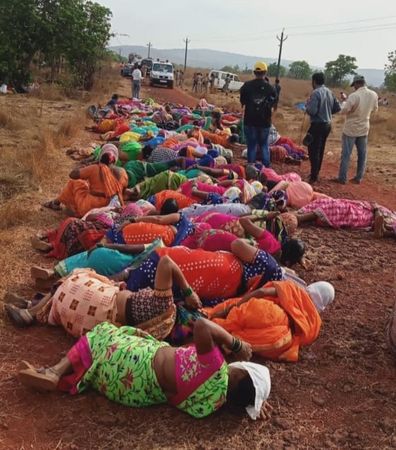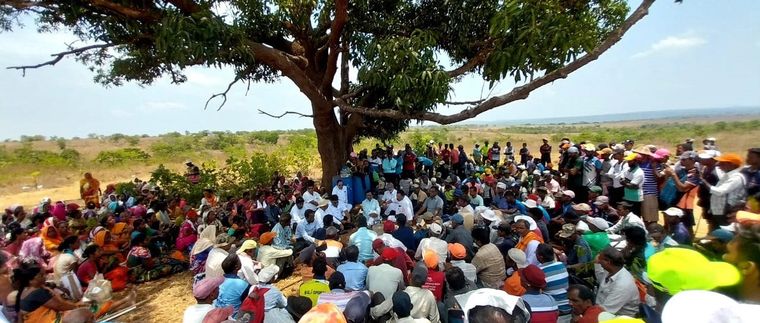On May 27, a sunny Saturday, some 30 men from the villages of Barsu, Goval, Shivane Khurd and Devache Gothane in Ratnagiri climbed atop the vast laterite plateau in their neighbourhood. They walked a mile further under the scorching sun and camped under a banyan tree, where they removed their shirts and lined up in front of a barber. He shaved their heads one by one and then they proceeded to a nearby site where a religious ceremony took place. “We have gathered here to perform the cremation rites of the state government,” said one of them. “This ceremony is called ‘pind daan’, which is performed on the day of ‘varsha shraddha’, the death anniversary of a deceased person. For us, the government of Maharashtra died when it announced that Barsu and nearby villages would be the site of the proposed Ratnagiri Refinery and Petrochemicals Limited (RRPCL) oil refinery complex.”
“Most of the villagers are against this project,” said Krishna Arekar from Shivane Khurd. Surveyors had collected soil samples from various sites on the plateau and the police had been deployed to protect them. “A big protest took place to stop the survey,” said Arekar. “The police attacked protesting villagers. Women were dragged to police vans and taken away. Men were arrested and locked up till the survey was completed.”
The RRPCL project is a joint venture of Indian Oil, Bharat Petroleum and Hindustan Petroleum with investment from Saudi Arabia’s ARAMCO and the UAE’s National Oil Company. It was originally conceived in 2015 as a Rs3 lakh crore refinery complex at Nanar in Rajapur taluk of Ratnagiri, and was scrapped in 2019 because of the opposition from the locals and the Shiv Sena, which was the BJP’s partner in the Maharashtra government. The project was revived amid the pandemic when chief minister Uddhav Thackeray, heading a coalition government with the NCP and the Congress, wrote to the Union government in 2021 that the project could come up on the plateau near Barsu village. Nanar and Barsu are just 10km apart, separated by the Arjuna river.
The work on the project gained momentum after Thackeray was toppled by his associate Eknath Shinde with the help of the BJP in June 2022. The government did not expect much resistance as the project had been shifted to the Barsu laterite plateau. It was wrong. The villagers formed the Barsu Solgaon Panchkroshi Refinery Virodhi Sanghtana (BSPRVS) and declared that they would not allow it on their soil.
Shinde told THE WEEK that some 70 per cent of the villagers supported the project and he was confident that the government would convince the rest. The BSPRVS activists said 80 per cent of the villagers were opposed to the project. “If the government is so confident, why aren’t they holding a referendum on the issue?” asked Deepak Joshi of Goval village. “We asked the collector and other officials how this project suddenly became good for people. What makes them think that the project would turn environment friendly by shifting it just 4-5 km northwards? They had no answers.”
The Barsu plateau has paddy cultivation, and mango and cashew plantations. It is also the source of potable water for all the villages at the foot. There are also hundreds of geoglyphs, unique Stone Age rock carvings. “All these will be destroyed if the project comes here,” said Joshi.
The villagers are upset that the people of Konkan are being branded as anti-development because of their protest against the refinery. “What we are opposed to is polluting industries, as we have seen how they damage the ecosystem,” said Amol Gole of Shivane village. “We have many chemical factories in Lote Parshuram MIDC area in our district and the pollution because of them is a huge problem. If small companies can cause so much damage, imagine what a huge refinery can.”
They are also not swayed by the promise of generating more than a lakh jobs and see no point in spoiling their environment for that. “During the mango harvest season, we have as many jobs,” said Gole. “People from Nepal and Uttar Pradesh come here for mango picking. Why is the government not getting projects, like the Vedanta-Foxconn [chip manufacturing facility], which would not have caused any pollution. We will oppose the refinery till our last breath, but if the government brings non-polluting projects, we will support it wholeheartedly.”

The villagers are miffed at the government calling their plateau barren land. “It is the source of our livelihood and the livelihood of the wildlife in this region,” said Satish Bane of Solgaon. “The villages get potable water from the streams that get water from this plateau. This source of water will get polluted if the refinery becomes operational.”
There are, however, many villagers who are willing to trade these for development. Siddhesh Marathe of Shivane, for instance, believes that the refinery will bring development to the region which is now dependent on Ratnagiri city, which is 60km away, for everything. “All big hospitals, schools and colleges are in Ratnagiri. The refinery has promised to build a 500-bed hospital here. They have also promised to build a kindergarten-to-graduation educational complex. Our boys will get jobs here and will not have to migrate to Mumbai,” said Marathe, whose family owns 50 acres of mango orchards.
The division runs deep in the villages. Marathe said he did not get local labour for his mango plantation because he was a refinery supporter. “Many people are secretly supporting the project but not taking an open stand because they fear boycott and other measures,” he said.
It is said that there are many fence-sitters. “Once the government announces a compensation package, many more will join the supporters,” said Gaurav Paranjape of Goval village. Hanif Musa Kazi, former president of Rajapur municipality, said that those who opposed the project were people who did not own land.
Big projects have always faced opposition in the Konkan region. A copper smelter project by Sesa Sterlite was abandoned. An Enron power project at Dabhol faced huge opposition from the BJP and the Shiv Sena. The saffron alliance swept the region on this plank in the 1995 assembly elections and eventually came to power in Maharashtra. It is a different thing that their government revived the project, which became operational as Dabhol Power Corporation. The Jaitapur nuclear power project, which is stuck at discussion with France, faced stiff local opposition. The only big project that the people of Konkan have supported is the Konkan Railway, where they wholeheartedly offered land for construction.
Interestingly, the Shiv Sena opposed the refinery project when it was part of the Devendra Fadnavis government “because the people of Konkan did not want it”. When the Sena broke the alliance and Thackeray formed a government with the Congress and the NCP, he suggested the project could come up in Barsu. Now he is again opposing it, claiming that he was misled by traitors (meaning Shinde and other rebels). The Congress and the NCP have taken the stand that the project can be implemented after convincing the local people.
Vandana Kharmale, regional officer of the Maharashtra Industrial Development Corporation for Ratnagiri-Sindhudurg region, said that the project would be hugely beneficial for the region. “The Konkan region has always known for its money-order economy; people migrate to Mumbai and send money home. That will stop as they will get jobs locally. People here are happy and content. They are supporting the project but are afraid that their village community might boycott them if they come out in open,” she said.
Kharmale said the geoglyphs―some 200 of them―would be protected. “The refinery will require 5,000 acres. It will be a 20 mmtpa refinery and not 60 mmtpa as originally planned. We will acquire land from Barsu, Dhopeshwar, Khalchi Vadi, Varchi Vadi and Goval villages. Shivane and Devache Gothne are not part of the refinery,” she said.
Engineers India Ltd drilled 82 spots on the plateau for soil samples. They have been sent to a lab in Hyderabad. “If the report is positive, MIDC will hold public hearings to ask people what all should be included in the compensation package and then the government will formulate the package,” said Kharmale.



